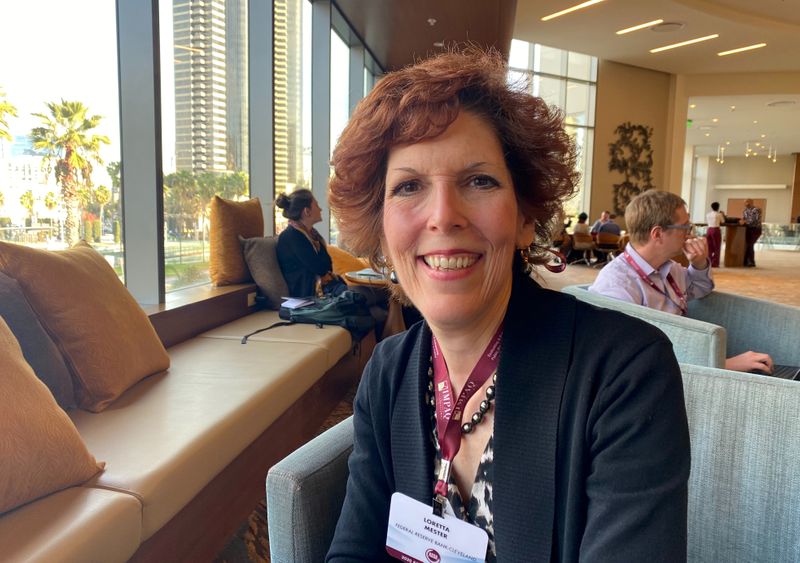By Lindsay Dunsmuir
WASHINGTON (Reuters) - The U.S. economy should continue to perform well this year and monetary policy is currently well positioned despite the risk posed by the coronavirus outbreak, Cleveland Fed President Loretta Mester said on Monday, as Wall Street stocks tumbled on worries the spread of the virus to multiple countries outside China could pose an escalating threat to global growth.
"The economy has been performing well and I expect that to continue," Mester said in remarks to the National Association for Business Economics conference in Washington.
She did, however, note that she has incorporated the potential impact of the coronavirus as a downside risk to her forecast this year, which is for U.S. economic growth around 2%, solid job market gains and low and stable inflation.
"At this point, it is difficult to assess the magnitude of the economic effects, but this new source of uncertainty is something I will be carefully monitoring," said Mester, who called the outbreak a "big risk"
That echoed other Fed policymakers, who have so far stuck to the line that it is still too early to predict the impact on the U.S. economy of the virus, while showing cautious optimism any effects would be temporary enough not to warrant a change in the path of monetary policy.
Those hopes may not last. European shares suffered their biggest drop since mid-2016 on Monday and oil plunged almost 5% on the news of a jump in coronavirus cases in Italy, South Korea, Japan and Iran.
Mester later told reporters that it would be folly to react to one day of financial market movements.
"I just caution that you don't want to overreact to volatility in the markets if you're a monetary policymaker," Mester said.
"You certainly want to take into account what's happening in financial markets and you certainly want to assess what financial conditions going forward are going to be but I don't think it's right to take one day and extrapolate that out."
The U.S. central bank uses a range of factors in deciding where interest rates are headed, including financial market cues. An increase in financial market volatility over time often leads to tighter financial conditions.
INCREASED VOLATILITY
"The immediate risk is now about financial conditions...the real impact is small - but volatility, if the dollar rises, stocks fall, that is a direct hit...," Gregory Daco, chief U.S. economist at Oxford Economics, told Reuters at the conference.
U.S. investors have brought forward their bets on when the Fed will next cut interest rates, to April of this year.
Goldman Sachs (NYSE:GS) cut its U.S. GDP forecast for the first quarter to 1.2% from 1.4% as it warned of potential production cuts should supply chain issues for U.S. companies linger into the second quarter.
Elsewhere in her speech, Mester said she sees the Fed's preferred measure of inflation returning to the central bank's 2% goal gradually over the next year or two and is not in favor of cutting interest rates to boost inflation.
"We have been undershooting our inflation goal for some time, so a natural question is whether policymakers should add even further accommodation to spur a faster return of inflation to our goal. I would not favor that at this time," Mester said.
She added that doing so could generate imbalances in the U.S. economy and that the Fed should be particularly attuned to financial market developments in the current environment.
